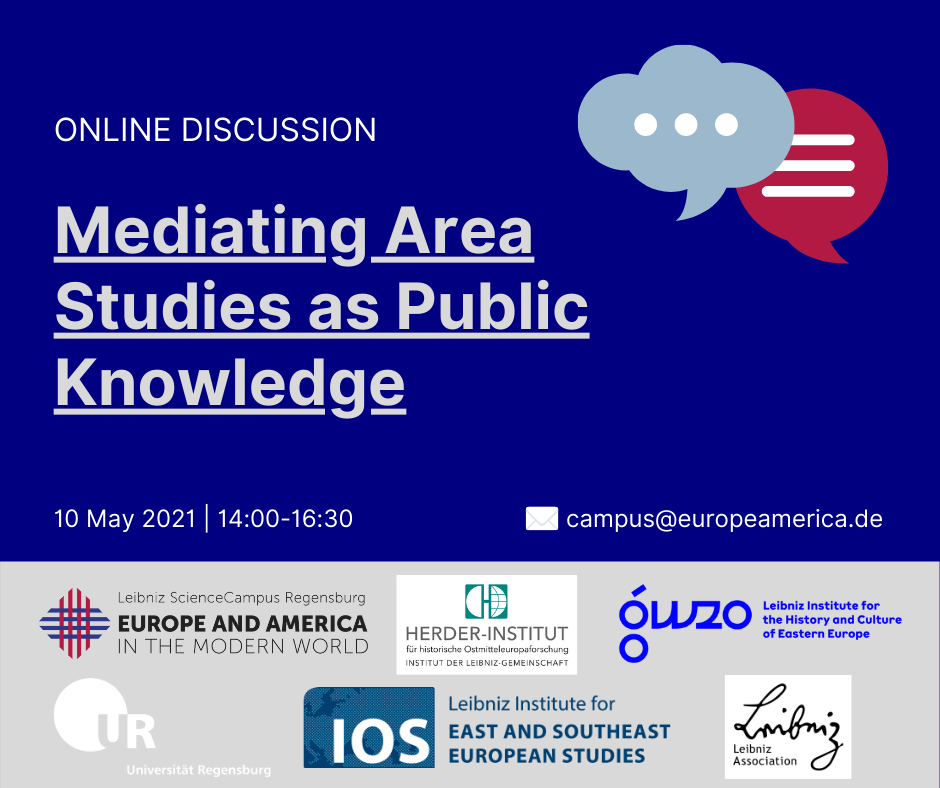Discussion - Mediating Area Studies as Public Knowledge
In this online series, doctoral researchers, postdocs and faculty in Leipzig, Marburg and Regensburg discuss the range and limits of Area Studies today, present their latest research in the field and debate pressing issues in scholarship and beyond. The fourth in the series addresses how area studies research and expertise can more effectively reach the public through new and established media. The aim is to bring academics, researchers, journalists and curators of other media together in dialog.
Area Studies under Discussion 4
This series is a collaboration between the Herder Institute in Marburg, GWZO in Leipzig, and CITAS and the ScienceCampus Europe and America in Regensburg.
Mediating Area Studies as Public Knowledge
When? Monday, 10 May - 14:00-16:30
Where? Online, via Zoom: https://uni-regensburg.zoom.us/j/69315172545
The question of how humanities and social science research engages with the public is an increasingly pressing issue. In recent years, there has been a growing sense that expertise and expert opinion is undermined in a shifting media and political landscape. Fields including public history, public archaeology and public sociology, as well as memory studies, heritage studies, tourism studies and museum studies, explore how scholarship and popular knowledge can engage in fruitful exchanges. How to relate research to the concerns and needs of broader society has also emerged as a key issue for area studies, especially in the twenty-first century. New technologies encourage interactive exchanges, while social media open up new possibilities for participation and for engaging audiences across borders as well as institutional and social boundaries.
This discussion will address how area studies contributes to and engages with broader debates on socially relevant issues. It will consider which formats are used for disseminating popular knowledge, ensuring academics and the broader public enter into dialogue, rather than maintaining a traditional divide between knowledge producers and consumers. Expertise can illustrate many socially, politically and culturally pertinent issues, translating it into public knowledge formats. But engaging with insights into popular understandings of the modern world could also benefit the way analytical frameworks on a globally and transregionally connected society develop.
Some of the issues where area studies expertise speaks to broader social concerns could include discussions on: military conflict and protest movements; the contestation of democratic norms; local consequences of global trade and multinational commerce; the geopolitical significance of soft power initiatives, and disinformation campaigns; the diversity of migration processes; memory cultures, memory wars and Geschichtspolitik. Reflections on the use of knowledge in media, museums, and tourism are also relevant to this discussion on how area studies are mediated and how the authority over knowledge production is distributed.
Programme
The event will see researchers and journalists offer short statements on their experiences of knowledge transfer and research communication. This will be followed by in-depth discussion. Our guests are:
- Dr Andreas Ernst, Neue Zürcher Zeitung (Zürich)
- Dr Jacqueline Nießer, Graduiertenschule für Ost- und Südosteuropastudien (Regensburg)
- Dr Sabine Stach, GWZO (Leipzig)
- Dr Antje Johanning-Radžienė and Felix Köther M.A., Herder Institute for Historical Research on East Central Europe, (Marburg). Project: "Copernico. History and Cultural Heritage in Eastern Europe"
- Dr Jan Surman, Masaryk Institute and Archives, Academy of Sciences of the Czech Republics (Prague). Projects: "hps.cesee: History of Science in Eastern, Central and Southeastern Europe" and "Anti-University/Антиуниверситет"
- Dr Philipp Venghaus, Häselburg (Gera), Curator of the Exhibition: "Leningradskii Feminism 1979"
Organizers:
Tatsiana Astrouskaya (Herder Institute, Marburg)
Corinne Geering (GWZO, Leipzig)
Paul Vickers & Joanna Moszczyńska (Leibniz ScienceCampus Europe and America/ CITAS, Regensburg)

